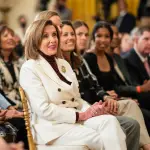In recent events, there has been a noteworthy shift in the positioning of some left-leaning media organizations and television programs regarding the ongoing conflict between Israel and Hamas. It appears that the mainstream media and programs like “The View” are now faced with a decision between supporting pro-Palestinian demonstrators and government officials such as Rep. Ilhan Omar of Minnesota, or standing with President Joe Biden’s public support of Israel.
Watch: Who Controls Whoopi Goldberg? She Promised Silence – Couldn't Last 9 Minutes via @WestJournalism https://t.co/57GzN4F2bE
— Maureen Jo Begley (@maureen_jo) May 1, 2024
The protests, which have spread to many universities across the United States, have led to over 700 arrests as the police have attempted to disperse the demonstrations. Specifically, at Columbia University, administrators have warned protesting students that they must end their encampment or face potential suspension. However, the protesters have refused to leave and have barricaded themselves inside Columbia University’s Hamilton Hall.
On a recent episode of “The View,” there was evident discord among the hosts regarding the student protests. While some expressed support for the protesters, others voiced concerns about their anti-Semitic rhetoric and behavior, suggesting that the framing of the college protests should not be solely viewed as pro-Palestinian or pro-Israeli.
The co-hosts also engaged in a conversation about the media’s coverage of the protests, cautioning that the media should be mindful of the narrative they are promoting and acknowledging the importance of peaceful activism in calling for change.
The discussion on “The View” sparked curiosity about the hesitation of one of the hosts, Whoopi Goldberg, to share her support for the protesters. Speculation arose as to whether this hesitance stemmed from the show’s alignment with the White House’s public stance on the conflict or from Goldberg’s previous controversial comments about Jewish people.
In summary, the evolving narrative surrounding the Israel-Hamas conflict has sparked conversations across various platforms, prompting contemplation on media coverage and the stance of public figures.




